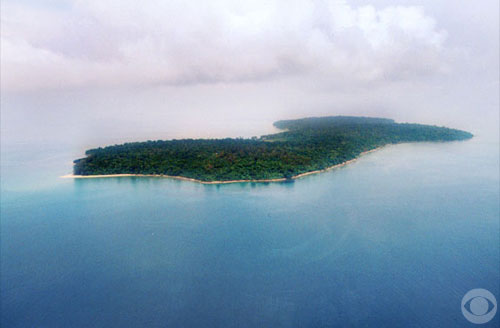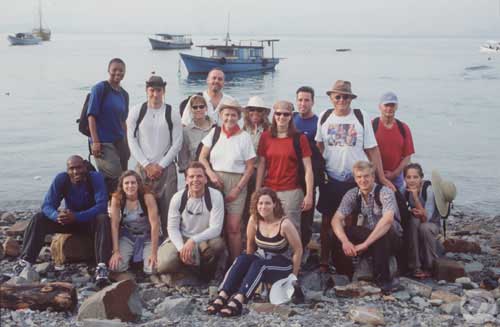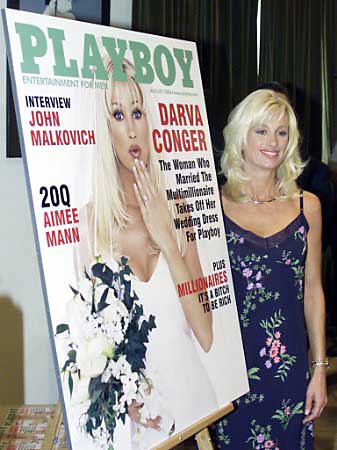�������������������������������������������������������� Gideon Federmann���������������������������������������������������������������������������������������� August 2, 2000
����������������������������� ��������������������������������������������������������������������Darwinism in Reality-Based TV Shows�������������������
For the last few weeks the American people have been glued to their TV sets. The reason is not Regis Philbin; it is the new reality-based TV shows. Game shows such as �Who Wants to Be a Millionaire?� are not entertaining enough for the American public anymore. Every Wednesday twenty five million Americans tune in to watch the new reality-based TV show �Survivor.�� �Big Brother� the newest reality show is being viewed five times a week, by ten million Americans. And last February � Who wants to marry a multi-millionaire?� another reality-based TV show captured twenty three million viewers. In today�s society it seems that the networks don�t really care about the causes and consequences of these new shows. Rather they are only interested in the money they make. I feel it is important for us to identify the causes and consequences of these shows, in order to figure out the psychological effects on the participants and the viewers. At the beginning of the new millennium, the popularity of the reality-based shows reflects the influence of Charles Darwin�s theory of� �Natural Selection� and even the long-discredited application of Darwin�s ideas to human relationships known as Social Darwinism on the American culture. These reality-based TV shows promote, intentionally or not, these theories and by doing so cause devastating consequences for their participants and society. Therefore, these shows must be taken off the air.�
Why do we find ourselves at the year two thousand sitting in front of the TV watching reality-based TV shows? I think it has to do with the new millennium. We feel that we need new experiences. We are starting something new and people don�t want to be left behind in the 20th century. The psychological effect of the new millennium is enormous, and TV is part of it. Therefore, people feel they must find new things on TV and reality-based TV shows are a perfect answer for this feeling. However reality is the oldest concept we as humans know. The networks understand this. So like good capitalists they decided to bring us these new reality based TV shows into our homes. Their successful formula involves huge amounts of money, real people, harsh environments which all add up to high ratings. But, is it safe for us to be watching these shows? Aren�t our real streets, real homes, real families, and real friends enough of a mirror for us?
Before examining the consequences of the shows, I will describe the three most popular reality shows. First, the most popular show is� �Survivor� which originated in Sweden. The surrounding of the show is very similar to the one described by Darwin. These are the words of Darwin used in his book Voyage of The Beagle in 1839 to describe the Keeling Islands, which are not far from the island of Pulau Tiga in the South China Sea, where the show �Survivor� is filmed:
�The strip of dry land is only a few hundred yards wide; on the lagoon side we have a white calcareous beach, the radiation from which in such a climate is very oppressive; and on the outer coast, a solid broad flat of coral rock, which serves to break the violence of the open sea�� Nothing could be more elegant, than the manner in which the young and full-grown cocoa nuts trees, without destroying each other�s symmetry, were mingled into one wood. A beach of glittering white sand formed a border to these fairy spots.�(Charles Darwin, 333).�
On the show sixteen Americans occupy the amazing island for 39 days, fighting for their survival. The group is divided into two tribes. Once ten people were left on the island the two tribes merged, so there is only one tribe left. The point then is to survive. Beautiful scenery and magnificent wild life are all part of �Survivor.�
The sixteen participants have to survive in nature without all of the technology and helpful materials that we use everyday in our modern society. The process of surviving means that each week one person is selected off the island. The participants are the ones making the selection .The last one to stay wins one million dollars. Mark Burnett, the producer of �Survivor� is a longtime Discovery Channel producer. He has experience in filming wild life, which he tries to bring into the show. Burnett was picked because of his ability to capture on camera the wild side of the show�s participants. The network�s goal is to show the audience the survival skills of men and women in nature.

The island of Pulau Tiga is located approximately 31 miles off the coast of Kota Kinabalu, Malaysia,
where the show �Survivor� takes place
The sixteen participants have to survive in nature without all of the technology and helpful materials that we use everyday in our modern society. The process of surviving means that each week one person is selected off the island. The participants are the ones making the selection .The last one to stay wins one million dollars. Mark Burnett, the producer of �Survivor� is a longtime Discovery Channel producer. He has experience in filming wild life, which he tries to bring into the show. Burnett was picked because of his ability to capture on camera the wild side of the show�s participants. The network�s goal is to show the audience the survival skills of men and women in nature.

The sixteen participants of �Survivor� moments before arriving to the Island
The second popular reality-based TV show, �Big Brother� originated in Germany, whose name is taken out of George Orwell�s novel �1984.�� On the show ten strangers are squeezed into a small house for one hundred days. The house, which is located in the parking lot of CBS�s offices, has two bedroom and one-bathroom. Located in this house are sixty microphones and twenty-eight cameras, which catch every move and word of the participants. The participants grow their own food, and TV, newspapers and radio are not allowed. This unnatural situation is designed to force participants to interact with each other. Every two weeks one person is selected to leave the house. People who watch the show call in and vote to determine the selection. The last one to stay wins half a million dollars. The show is a perfect example of what these shows are all about: Viewing ourselves on TV. In this simple process of viewing ourselves, we find a more profound entertainment. We actually enjoy watching our nature in action. We love seeing how people react, think, and speak, as these are all components of our nature.
� �
�
�������������������������� An aerial view of the �Big Brother� house
The third reality-based TV show �Who Wants to Marry a Multi-Millionaire?� aired last February on the Fox network. The point of this one-time show is for fifty women to compete to marry one multi-millionaire, whom they have never met. Like the other reality shows the show was a big hit, pulling in twenty three million viewers. The multi-millionaire Rick Rockwell had to pick one woman to marry him, like an alpha male picking his mate in the wild. In our society today alpha males are associated with money, and Rick Rockwell fit that description, or at least that is what the women thought he had. It turned out that Mr. Rockwell was not a multi-millionaire, so the marriage was canceled.

Darva Conger, the women that won Rick Rockwell�s heart in the show �Who Want to Marry a Multi-Millionaire?�
What is the common base for all of these reality-based shows? The answer is simple: Selection. In each of these show people select other people. The multi-millionaire selects his presumed future wife; the tribes themselves select who will leave the island in �Survivor;� and the viewers decide who must leave the house in �Big Brother.� To understand the significance of selection we must travel back in time to the mid nineteen-century, England. In 1859 a very talented young naturalist by the name of Charles Darwin published his new theory of evolution of species, the well-known theory of �natural selection.� Darwin�s theory tries to explain the phenomenon of evolution. The theory of �natural selection� suggests that nature selects species that are most adaptive to their environment. Darwin�s writes in his book The Origin of Species:
�Natural selection acts solely through the preservation of variations in some way advantageous, which consequently endure. But as from the high geometrical powers of increase of all organic beings, each area is already fully stocked with inhabitants, it follows that as each selected and favored form increases in number, so will the less favored forms decrease and become rare.� (Charles Darwin, 153).
The show �Survivor� is a great example of �Natural Selection� at work. The environment of the show demands that the participants use their natural survival skills. For example Richard, one participant, has a remarkable talent for fishing. He is aware of his skills and he also knows that nobody else in the tribe is capable of catching fish. Therefore, he knows he is not going to be selected off the island anytime soon, because if he is kicked off the other members of tribe will have nothing to eat. Furthermore, the show�s producer invented another element of �natural selection:� Before every selection there is a contest between the members of the tribe. The contest tests their natural skills, like navigating in the jungle. The winner of the contest wins immunity from being selected of the island that week. The �fittest� contestant survives, just as in nature.
Darwin goes on in his book The Origin of Species to explain his theory of �sexual selection.� He suggests that the fittest male will have the most chances of leaving his genes in nature, because he has adapted best to his environment: �Generally, the most vigorous males, those which are best fitted for their places in nature, will leave most progeny.� (Charles Darwin, 136). The show� �Who Wants to Marry a Multi-Millionaire?� is a perfect example of �sexual selection.� The male was presented as a well-adapted male in modern society. Therefore, women were willing to compete over him on national TV.� In this case, financial success represented fittest for survival.
Following Darwin�s theory, in the late nineteen century Herbert Spencer introduced another selection theory, the theory of social selection, also known as� �Social Darwinism.� Spencer who is known for his famous sentence� �survival of the fittest,� was the first to say that selection is also made in society. Society chooses its components: those who fit the best are those who have the highest chance of surviving in our society. Spencer and his followers took Darwin�s theory of �natural selection� and applied it to society. They suggested that our social behaviors demonstrate a will to survive. In Social Darwinism in American Thought Richard Hofstader explains social Darwinism as follows: � The most popular catchwords of Darwinism �struggle for existence� and �survival of the fittest,� when applied to life of man in society, suggested that nature would provide that the best competitors in a competitive situation would win, and that this process would lead to continuing improvement.� (Richard Hofstader, 6).
�Big Brother� is a great example of �Social Selection.� The ten people living together must interact with each other. Further, the show is broadcast five nights a week and twenty-four hours a day on the Internet. Therefore, the audience can easily discover the personalities of the participants by watching the show. The audience determines those will leave the house, and their choice is based only on the social behavior of the participants. Those who have strong social abilities will stay on the longest.
On the show� �Survivor� we see �social selection� at work as well. For example, when the two tribes merged the Tagi tribe decided on an alliance. They decided first to get rid of the members of the other tribe, the Pagong, in order to achieve voting power. The Pagong tribe, being na�ve, allowed this to happen, and they found themselves in a situation where they are only three people while Tagi has five people. This is a perfect example of �survival of the fittest� in a social context. The Tagi tribe was smart enough to think of their own survival. This resembles a war, when you do not think of your enemy�s feelings, but only of your own survival. An alliance is a social behavior that men have performed for centuries, and it increases an individual�s chances of survival.��
After understanding both theories we can easily see their reflection in the new reality-based shows. The selection process made in the shows is similar to the one which occurs in nature and in our daily life in society. At first glance this process of selection seems harmless or even positive, but the truth is far from that. The shows are broadcast in the medium of television. The popularity of these shows can easily create devastating consequences for the losers, the winners and society.
�
Obviously, these shows have negative effects on the losers. The shows are being broadcast nationally and achieve high ratings. �Survivor� first show pulled in around twenty five million viewers. The participants are aware of the mass exposure that they�re under. Therefore, the process of selection becomes a painful one. If nature decides to select species to be extinct, the species probably experiences a painful process. The species probably cannot find any food nor can they find any mate to reproduce with them. So imagine in our modern society how one must feel if he is selected off these TV shows. Knowing that you are not as successful as you might believe is usually a painful feeling. The most obvious example of the devastating consequences on the participants was revealed in the Swedish version of �Survivor.� One woman who was voted off the island committed suicide. She felt bad about herself and could no longer accept her reality. She could not accept that she was inferior to others on the island. The show actually was the cause for taking her own life. In my short history I cannot recall an �entertainment show� causing anyone to do such a thing. What is more important, protecting the losers or encouraging the winners? I believe that we should protect the losers, because these shows produce much more losers than winners.
However, the big network�s executives and producers are fully aware of the consequences of these shows. Paul Romer, the Dutch producer of �Big Brother� believes that there are ways to reduce the likelihood of any participants suffering from lasting psychological damage. He believes that besides using psychological screening tests, the networks should also be smart in their choice of participants. He suggests that there should be a specific mix of men and women, young and old, leaders and followers. The networks are trying to prevent any misfortune from happing. But my question to them is why air a show that can have such consequences? It seems they are playing with fire, and any minute someone might get hurt. The potential negative consequences for losers are reason enough to ban these shows.
The winners of the shows are not fully protected against painful consequences, either. They become superstars over night. They are invited to talk about their experience on most popular talk shows. The media haunts them. But like other superstars the hype around them disappears after they no longer interest the public. The media forgets about them. In Europe this was the experience of some winners, who became famous celebrities after winning the reality-based shows. When some winners in Europe lost the power they once possessed they became drug abusers or alcoholics. The majority of winners become deeply depressed. They know that their life is changed forever. It seems that the winners of the shows have reached the high point of their life while the show is still popular and after that the only way for them is down road. Even the money they win cannot help them to be happy. In Europe the winners have become more addicted to being a celebrity than addicted to money. For example, one participant by the name of Sabine from the show in Holland says she feels that she was more closely observed after the show than when she was in the show. But a few months later nobody cared about her. This eventually caused her to become depressed for a period of time. I presume that similar consequences might occur here in the U.S. U.S society is not so different than European society, so the U.S participants are not protected in any special way. The long-run consequences of these shows are hard to predict now, but we can assume that the winners of these shows will carry memories, especially concerning the selection process, for a long time.
In addition to these negative effects on their participants, these shows have negative consequences for society as well. The selection process on the shows encourages our society to be a society of �winners� and �losers.� This unhealthy trend can cause devastating effects on our daily lives. We are becoming a society of narcissists, where only the strongest, smartest, and beautiful humans can succeed and thrive in society. The selection on the reality-based shows strengthens this behavior. In my research, I found that the only important thing for the viewers of the shows was, who is going to win. They laughed about the losers, acknowledging all of their weakness is if they were part of the show, while praising the winners for doing a great job on the show.� The selection process is a symptom of a narcissistic society, so putting it on the air 5 nights a week exposing it to millions of people is a bad idea. We should not encourage such behavior; rather we must try to prevent it from spreading. American society is already narcissistic enough.
Of course it is possible that these shows can have positive consequences for society, too. Anthropologist Helen Fisher says that it's no surprise that reality-based TV shows are such a hit. She believes that humans develop by watching other people and learning from their mistakes. It�s actually part of our survival instinct. The shows allow us to check want kind of behavior we should select in order to be successful in real life. The viewers can actually change their behaviors. The selection in nature is hard to change. Species in nature change their behaviors over a long period of time. Meanwhile, humans have a cognitive ability to change behavior in a short time. But in order to change behavior we as humans first must learn which behavior is favorable. These shows in some cases do exhibit selected behaviors, which can help us advance in our own lives.
We as humans have the ability to change our social behavior in short period of time. The question is whether viewers of these shows try to use them as a selection process of favorable behaviors? The answer to this question is no. The viewers of these show do not try to gain any vital information concerning the process of selection. Even the smartest of humans sitting in front of his TV suddenly loses his intelligent capabilities. It seems that TV drains all of our intelligent capabilities. Therefore, I see no reason of the selection process being part of TV. The selection process is a complex process that allows nature and society to fit best to current times.�������
The selection on the shows is a process that should be left for nature and society. The process can be sometimes very cruel and painful. It is true that our society is full of painful situations. Nevertheless, our TV networks are aware that painful situations generate high ratings. They should not take advantage of these situations and use them for profits. The inhuman behavior by networks all over the world was expressed after the suicide in Sweden. Almost every network in world tried to buy the rights for the show only because of its impact on the participants and the viewers. The big networks have social responsibility in their business actions; they should not take the chance on losing one single human being for the price of a show. They are aware of the effects of these shows, but they still air them. The question is why? The answer is simple, not because they believe people get any benefits form the shows; it is simply about money. I call it greed.
I know we cannot stop people from watching TV; it is simply something that could never be done. But we can forbid some shows from airing, and the new reality-based TV shows should not be aired. These shows have devastating consequences on the participants, viewers, and society. The long run consequences are hard to determine, because this is a fairly new phenomenon. Nevertheless, the big networks that bring these shows into our homes must be dealt with in the most serious manner, because they are not thinking of our well-being. We must show them that our well-being and our mental health are much more valuable than profits or ratings. Selection is a process that should be left to nature and society. We should not exploit this powerful process for money.
TV shows are meant to be entertaining and not the cause of serious damage to society. If the big networks truly want to bring reality-based TV shows for the benefits of their viewers, I suggest that they draw a lesson from PBS show �1900 House.� This show is educating and intriguing. It is about learning how people lived in the Victorian period. No money is involved. No superstars are created. And normal people such as myself can really gain interesting and useful information concerning our evolution over the last hundred years. �������
����������������������������������������������� Works Cited
Big Brother. Home Page. {http://webcenter.bigbrother2000.aol.com/entertainment/NON/}.
�Big Brother� Paul Romer. CBS, New York. 20, 27 July 2000.
Braxton, Greg. �Big Brother Race Reactions.� Latimes.com 20 Jul 2000. {http://live.altavista.com/scripts/editorial.dll?ei=2007058&ern=y}.
Chesterton, G. K. What�s Wrong With The World. San Francisco: Ignatius Press, 1994.
Darwin, Charles. The Origin of Species. New York: Random House Value Publishing, Inc., 1976.
Darwin, Charles. Voyage of The Beagle. New York: Penguin Books, 1989.
Hofstadter, Richard. Social Darwinism in American Thought. Boston: Beacon Press, 1992.
Lasch, Christopher. Culture of Narcissism. New York: W.W Norton& Company, Inc., 1979.
Orwell Project. Home Page. {http://www.orwellproject.com/}.
Postman, Neil. Amusing Ourselves to Death.� New York: Penguin Books, 1985.
Shales, Tom. �Survivor: An Island Not Remote Enough.� Washington Post 1 June. 2000.
{http://washingtonpost.com/cgi-bin/gx.cgi/AppLogic+FT}.
Spencer, Herbert. The Man Versus The State. Indianapolis: Liberty Fund, 1982.
Spencer, Herbert. The Principles Of Ethics.� 2 Vols. Indianapolis: Liberty Fund, 1978.
http://washingtonpost.com/cgi-bin/gx.cgi/AppLogic+FTSurvivor. Home Page. {http://www.cbs.com/network/tvshows/mini/survivor/}.
�Survivor� Mark Burnett. CBS, New York. 19, 26 July 2000.
Toffler, Alvin. The Third Wave, The Classic Study Of Tomorrow. New York: Bantam Books, 1980.